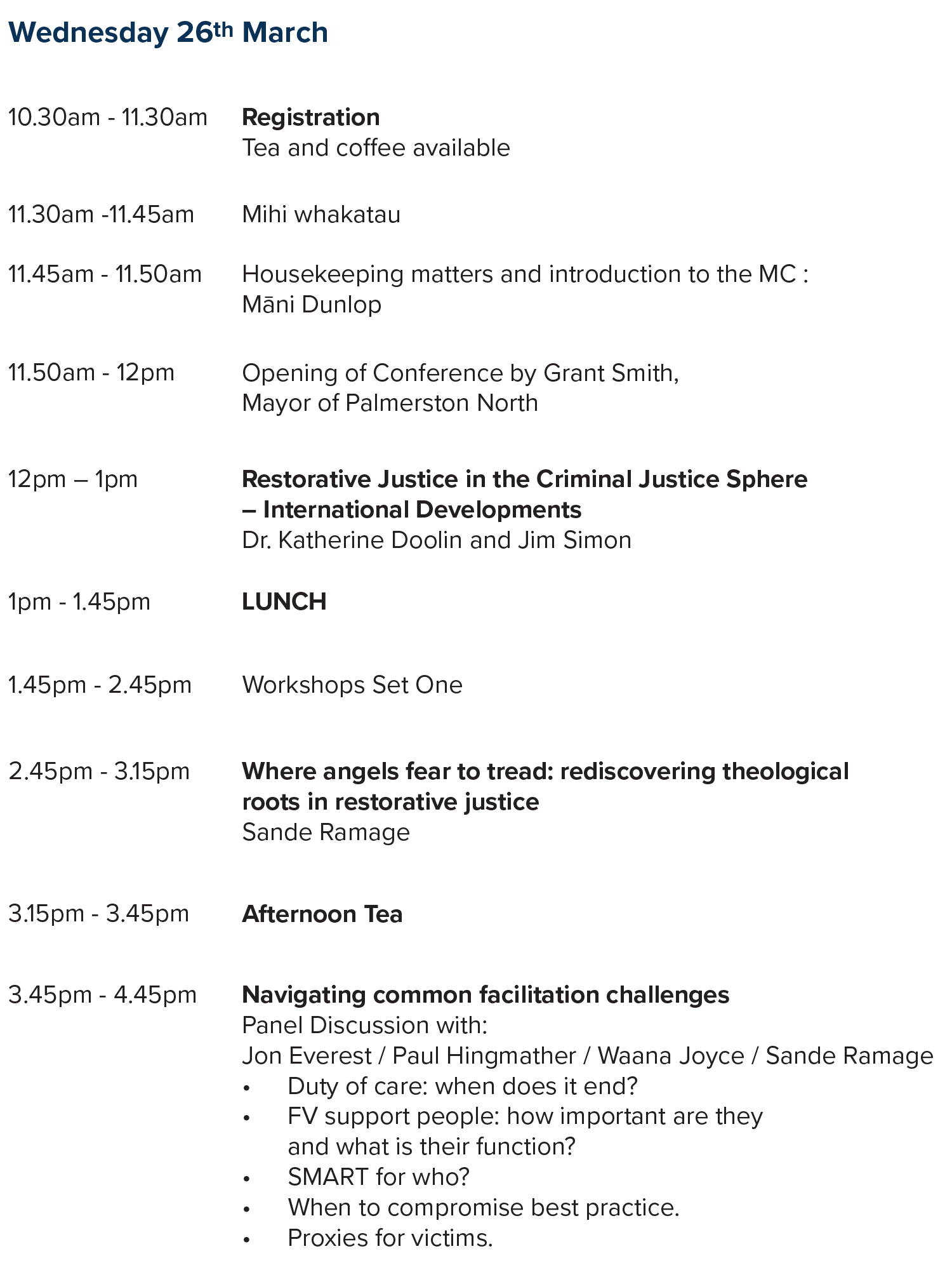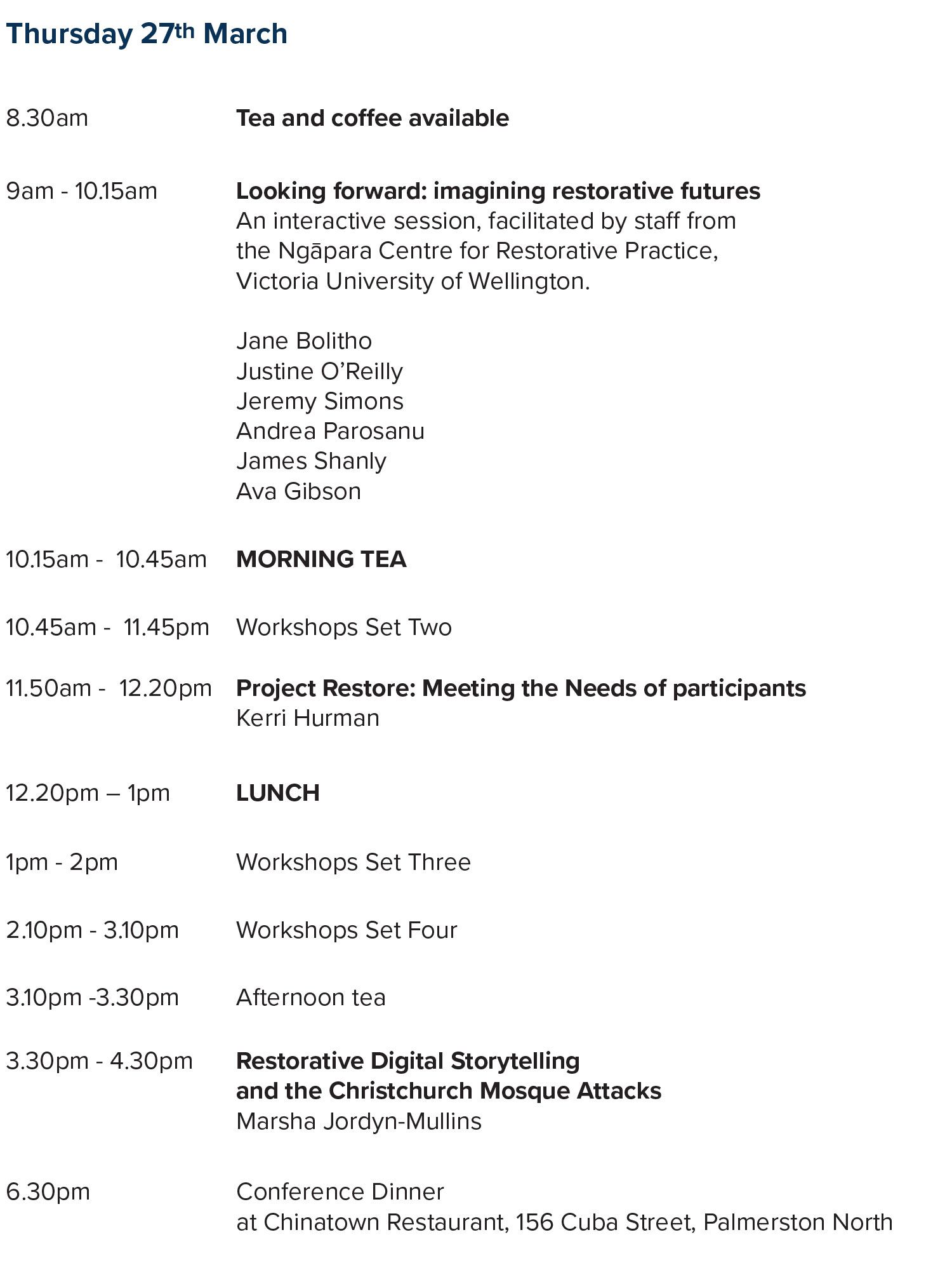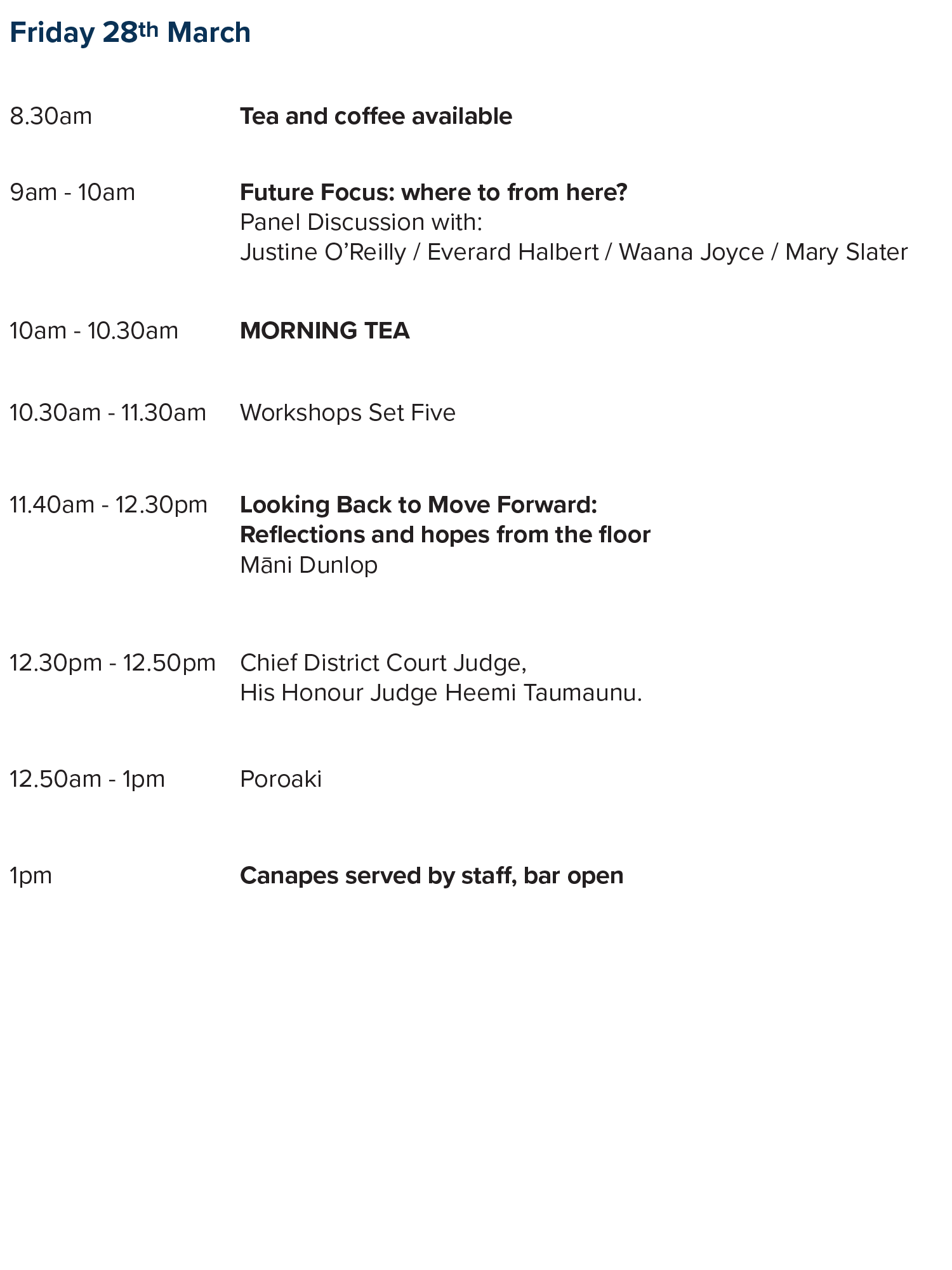
Palmy Conference and Function Centre
354 Main Street Palmerston North
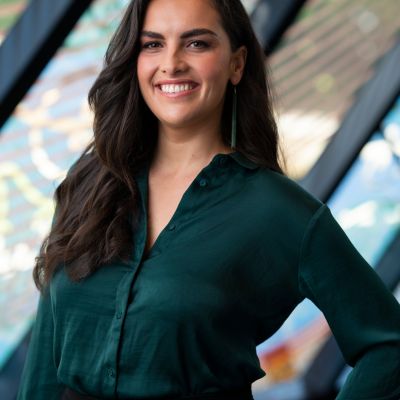
MC - Meriana Johnsen
Meriana Johnsen (Ngāi Tahu, Rangitāne o Wairau) is a journalist, writer, and broadcaster. She began her career in 2018 at RNZ as a reporter, and since then has dedicated herself to platforming te ao Māori stories in the mainstream, whether it be co-hosting and producing rangatahi podcast Nē? or investigating and presenting current affairs stories for The Hui. She is also a second-language learner of te reo Māori, passionate about revitalising the language within her whānau, hapū and iwi.
KEYNOTE PRESENTERS
Project Restore
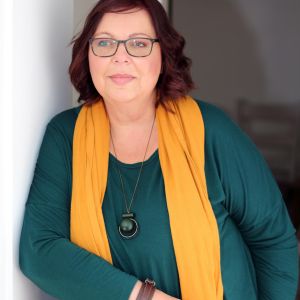
Kerri Hurman
Before that she headed the crisis response in Waitemata for Family Violence, Sexual Violence and Refuge for eight years. She has extensive experience leading teams in not only the violence sector, but also care and protection, and youth residential care.
In December 2021 Project Restore commissioned an independent research study that ran over two years. The purpose of this evaluation was to assess Project Restore’s efficacy in meeting the needs of all participants.
We are now able to feed back to the sector the participants' thoughts on what went well, some areas of improvement and what we have put in place following this evaluation.
Restorative Justice in the Criminal Justice Sphere – International Developments
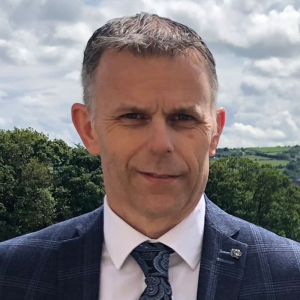
Jim Simon (Chief Executive, UK Restorative Justice Council)
For the past four years, Jim has chaired the Advisory Board of the All-Party Parliamentary Group for Restorative Justice, during which he spearheaded a nationwide inquiry into the application of restorative practices within the criminal justice system. Recently, he also directed an investigation into these practices in the educational, health, and social care sectors in the UK.
In addition to his role at RJC, Jim is an active founding member of the Global Alliance for Restorative and Social Justice, collaborating with like-minded individuals on a global scale to promote the integration of restorative practices for a fairer society. His contributions in this field emphasise his commitment to creating a just and equitable society.
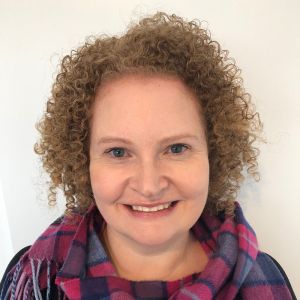
Dr Katherine Doolin
She researches and teaches in the areas of criminal law and criminal justice, with particular expertise on restorative justice, prisons and youth justice.
Kate has been a Visiting Scholar at the University of Cambridge and the University of Bath in the UK, and at the Institute of Criminology at KU Leuven in Belgium.
She has extensive experience of carrying out evaluations of restorative justice schemes for adult and youth offenders. Since completing a PhD in Law at the University of Kent on restorative youth conferencing, Kate has published widely on restorative justice and presented on her research at over 40 international conferences, workshops, and seminars.
Restorative justice can take many forms in a criminal justice setting, including community led programmes, diversionary approaches, and pre-sentencing and post- sentencing initiatives. A restorative approach to justice strives to maximise the participation and empowerment of and encounter between those who have been harmed, those who have caused harm, and the community.
The focus of this presentation is two-fold. First, the presentation begins with an overview of international developments of restorative justice initiatives in the criminal justice context.
Second, drawing on the presenters’ research on restorative justice in prisons in the U.K. and Aotearoa New Zealand, the presentation offers insights from interviews and focus groups with victims, offenders, and those working in the prison and restorative justice sectors to help better understand the motivations of, the gains and challenges for, and impact on, victims and offenders taking part in restorative approaches in prison. In so doing, the presentation explores strategies to mobilise the opportunities for restorative justice practices and processes to influence positive change across the prison estate.
Practice versus Principles: Insights from the Ngāpara Centre for Restorative Practice, Victoria University of Wellington
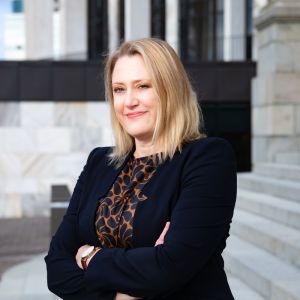
Jane Bolitho
Alternative RJ
Options
.
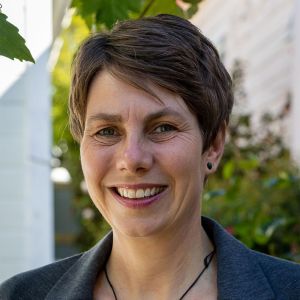
Andrea Păroşanu
Presentation on the results of a pilot study on alternative restorative options being conducted at three sites across New Zealand.
Restorative Accompaniment: Practice, Posture, and Positionality for a Restorative Movement
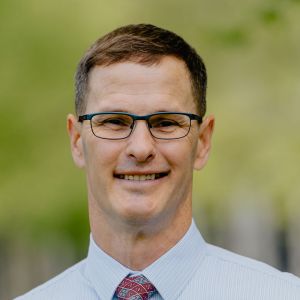
Dr. Jeremy Simons
Jeremy has over 20 years of experience as an educator, organiser, and community-oriented researcher. His current scholarship and research support restorative initiatives in education, justice sectors, and community contexts. Born and raised in the Philippines, he is curious about how culture interacts with restorative justice, peacebuilding, and community development.
The idea of ‘accompaniment’ as a way relating has been used in a variety of professions and movements, including social work, psychology, engaged anthropology, pastoral care, and cross-border human rights activism. However, there is little written in what this might look like in the Restorative Justice Practices, as well as the wider RJ movement.
Drawing on Mary Watkins ideas of mutual accompaniment, Jeremy will sketch some preliminary thoughts and provocations to stimulate further discussion on how accompaniment could be a constructive and transformative way of being and relating for people committed to restorative practice.
Where angels fear to tread: rediscovering theological roots in restorative justice
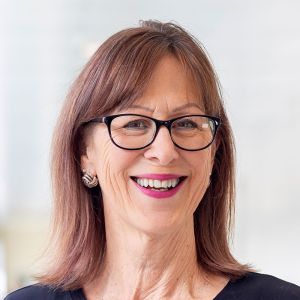
Sande Ramage
Sande’s previous work life includes roles as priest, prison officer, PARS Field Work, change management in health and welfare, and religious studies teaching, along with school and military chaplaincy.
Restorative justice entered my life when I was studying theology while training to be a priest. The combination made intellectual, heart and soul sense to me. 20 plus years later and working as a restorative facilitator, I’m aware that these profound theological underpinnings have disappeared from our practice, conversation and memory.
Has the fear of being ‘religious’ got in the way of accessing this rich store of knowledge or is being caught in the court system the blind spot?
Where angels fear to tread draws on my healthcare chaplaincy experience to show similarities with restorative work, noting how in both we bear witness to pain, loss, shame and suffering as stories unfold. And how by reincorporating the theological wisdom of how transformative change happens, we could enrich practitioners’ skilful presence and deepen the healing power of restorative for our time and place.
Restorative Digital Storytelling and the Christchurch Mosques Attacks
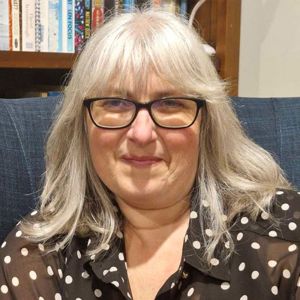
Marsha Jordyn-Mullins and Jeremy Simons
Marsha came to New Zealand from Belarus as a child in 1979, when her family fled the oppressive antisemitic Soviet regime. She holds a Masters in Psychology and became interested in restorative justice while working as a Programme Facilitator for Corrections, and hearing stories of restorative processes which had changed the lives of offenders. Marsha joined Restorative Justice Services Ōtautahi as a Coordinator in 2015, and became a facilitator in 2022.
Following the devastating terror attacks of 15 March, a Royal Commission was established to explore what may have been done to prevent this event, and what steps might be taken to repair harm and prevent further extremist violence. In total, 44 Recommendations were made in the report that was delivered to Parliament in November 2020. The 27 th recommendation pertained to restorative options. It says: Direct the Department of the Prime Minister and Cabinet in collaboration with relevant Public Sector agencies to discuss with affected whānau, survivors and witnesses of the 15 March 2019 terrorist attack what, if any, restorative justice processes might be desired and how such processes might be designed and resourced. Several people from Restorative Justice Services Ōtautahi Christchurch (RJSOC) had been involved to varying degrees, in maintaining contact with folk from the impacted communities in the 5 years since the attacks. On a separate track, Te Ngapara Centre for Restorative Practice helped conceptualise restorative policy options after the attacks, while encouraging institutional stakeholders to dialogue with community in developing practical restorative pathways. A partnership was formed between the two agencies in December 2023, and various restorative approaches were explored. Efforts were hampered by many factors including: complex trauma suffered by multiple stakeholders; the number of people harmed (including first responders, witnesses etc); politics within the communities of people harmed; wider political and public interest in the subject. Contact with the terrorist was deemed unfeasible, and with the election of a new coalition government, exploration of other formal, restorative options was terminated. After extensive conversation with communities over a period of several months, a digital storytelling project was designed to enable anyone impacted by the events of 15 March to talk about their experience and their journey since the attacks. The first group of participants were supported in formulating their story and recording their narrative. This process enabled participants to process and distil the events that impacted them, and to create a record for them to share with others. In this presentation, we will explain how we arrived at this model and what we have learned thus far. We will also share our ideas regarding the publication of the films created and other restorative facets of this work.
PANELISTS
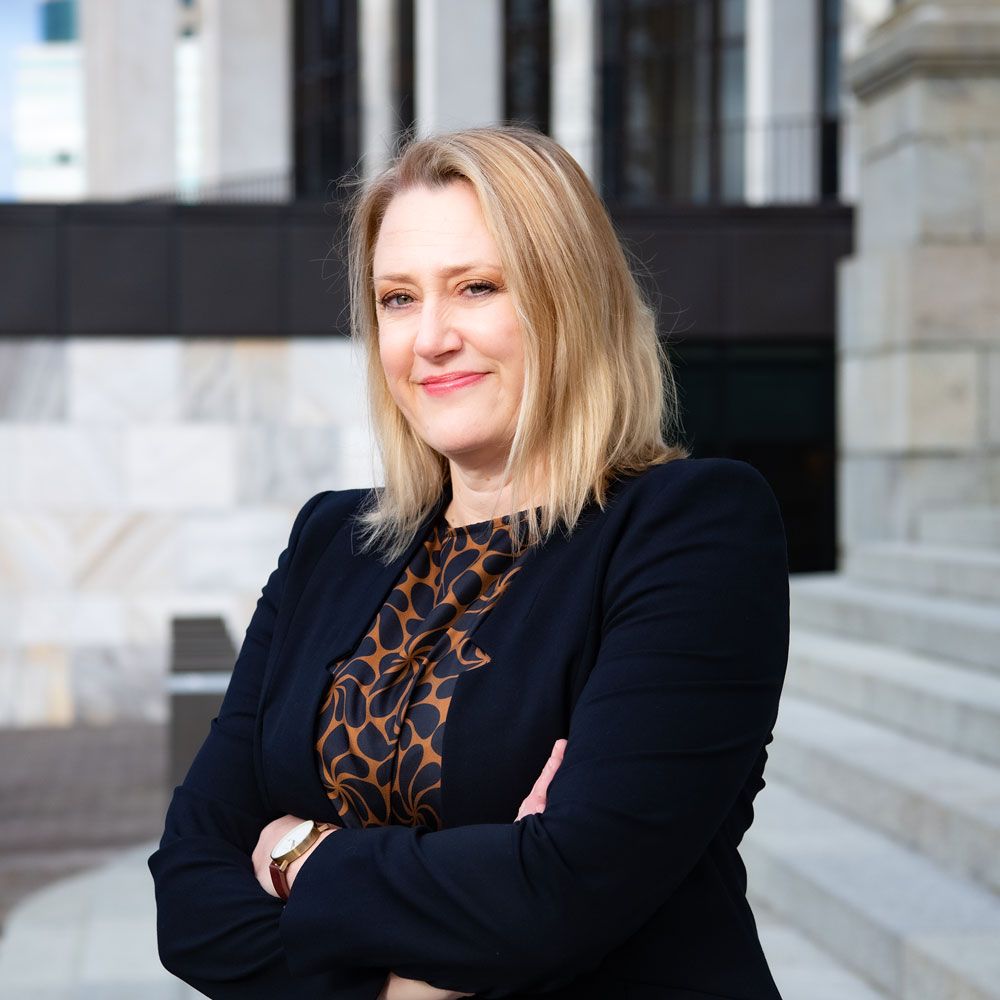
Jane Bolitho
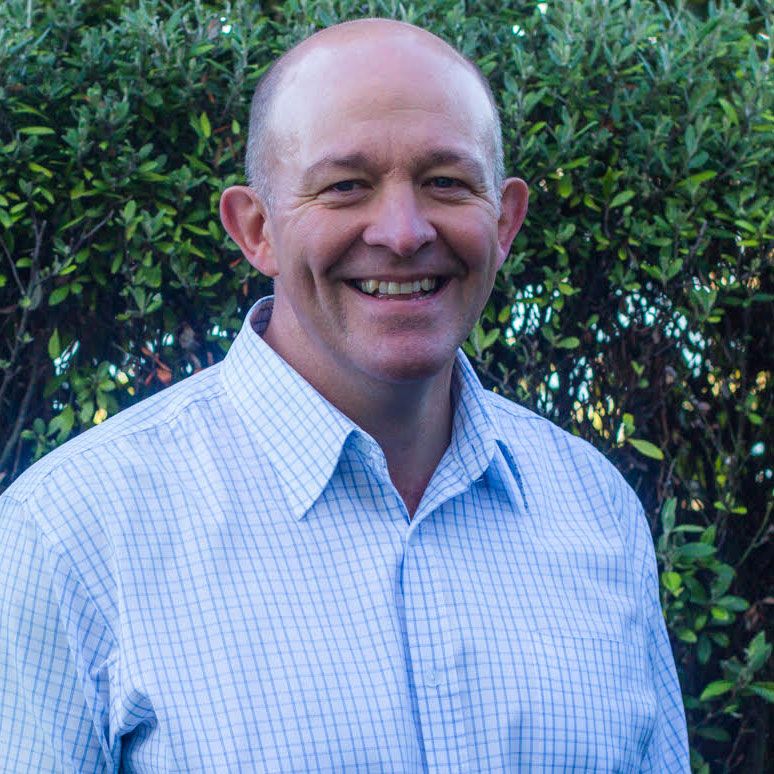
Jon Everest

Everard Halbert

Paul Hingmather
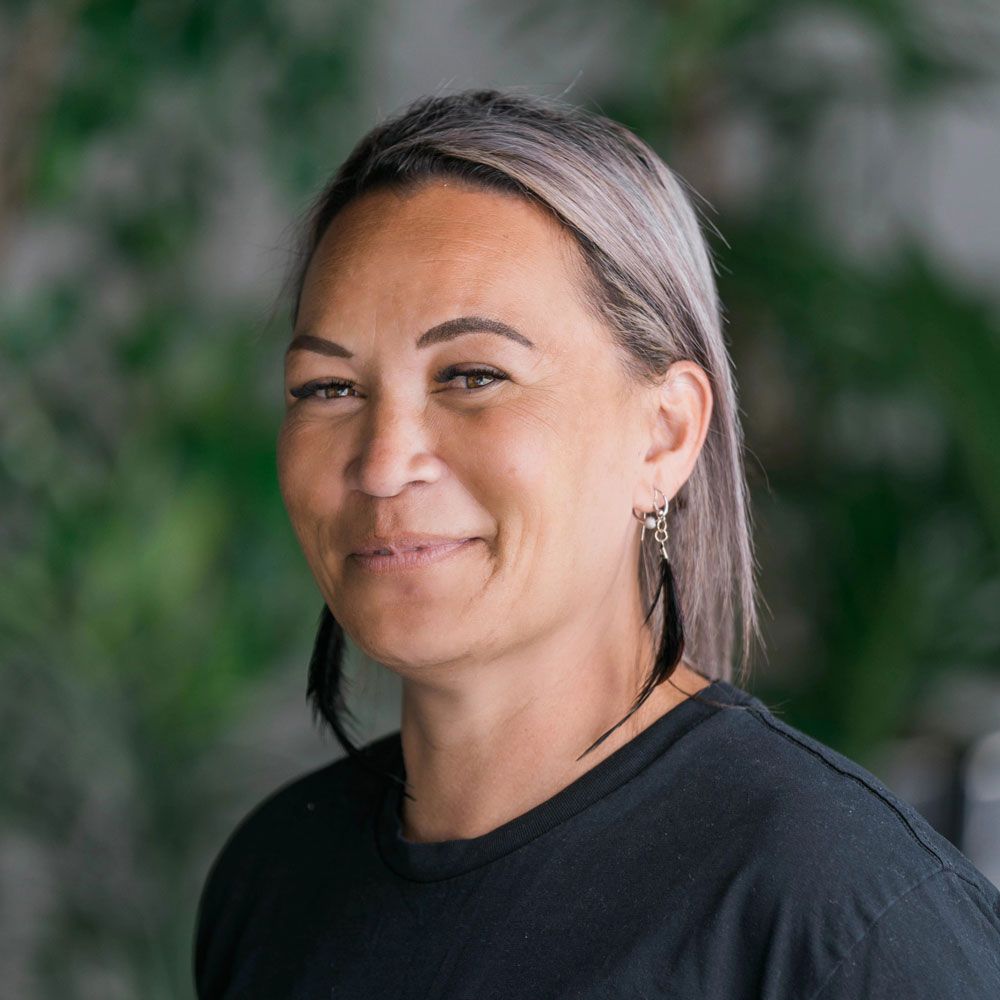
Waana Joyce
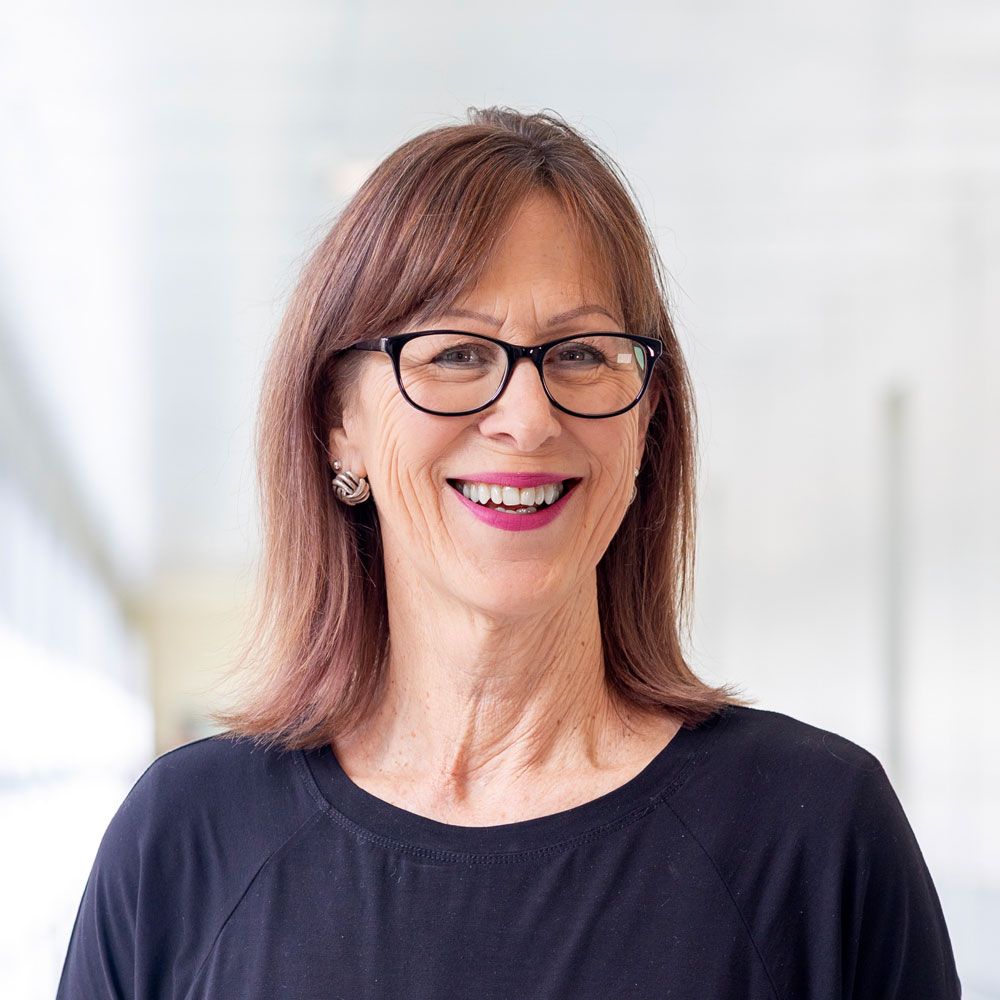
Sande Ramage
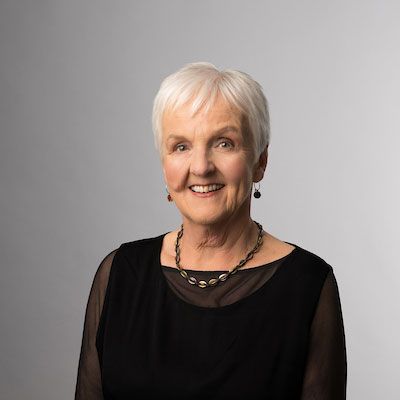
Mary Slater
Workshops at a Glance
Wednesday 1.45pm
Thursday 10.45am
Thursday 1pm
Thursday 2.10pm
Friday 10.30am
WORKSHOPS
Building Cultural Awareness: Working with Indian Communities in the RJ Space
Jessica Singh
Christabel Sami
Outline
An interactive workshop to upskill RJ practitioners by enhancing their understanding of cultural dynamics when engaging with Indian communities. Topics will include the importance of hierarchy, the role of extended families, and the emphasis on respect, honour, and community reputation.
Participants will be guided through real-life case studies to help them recognise and challenge their own biases, and will leave with actionable strategies to ensure a more inclusive and culturally competent approach in their RJ practice
Restore You
Helena Weideman
Helena is an experienced facilitator with a B. Com (Hons) in organisational psychology and additional certifications, including the Myers-Briggs Type Indicator, Certified Coach through the International Coaching Community, Crucial Conversation Facilitator, and Certified Happy For No Reason Trainer.
Drawing upon over 20 years of experience within the corporate world, Helena is a skilled facilitator who has supported leaders’ and teams’ development in large and complex organisations in both the private and g Government public space.
Her own journey, from career-mom burnout, the challenge of an international move with her family, and sudden job loss, led her to embrace the transformative Happy for No Reason programme. Helena works with teams and individuals who are tired, overwhelmed, burnt out going through change. Her workshops and coaching give you the inspiration, energy in confidence to go from struggling the supercharged.
Join her in the pursuit of a happier life.
Outline
Are you feeling overwhelmed, drained and exhausted at the end of the day?
Restore You is a fun and dynamic session where you will:
- Boost your physical, emotional, and mental energy.
- Develop science- backed happiness-boosting habits (just 10 minutes a day).
- Find inner peace and joy, no matter what life’s
challenges.
The work of restorative justice can be mentally and emotionally challenging. This workshop is like a drink of water where you learn how to restore your own energy and happiness, every day.
Incubated in Terror: the lived experience of childhood abuse and the long-term effects of traumatic brain injury
Tee Whiting
Tee is a survivor of child abuse and neglect, and an adult survivor of intimate partner violence, coercive control and entrapment, physical and emotional violence, financial control and abuse, and sexual violence. She is currently in the final stages of a master’s degree in Health Practice, majoring in violence and trauma studies.
Outline
This presentation is from the perspective of the eldest of six children of a single mother- herself a victim of child abuse. Her children were raised in an environment of extreme, unpredictable, and irrational physical violence, gross emotional neglect and psychological and verbal abuse.
The workshop will focus on –
- The impact of traumatic brain injury caused by family violence.
- The intersection of childhood trauma with adult
behaviour. - Attachment in neuro development: what happens when the caregiver is the source of unpredictable violence and neglect.
Restorative Justice and Mediation: Shared Journeys?
Virginia Goldblatt
Virginia Goldblatt MNZM, MA (Hons), DipBusStuds (Dispute Resolution), FAMINZ(Med), MInstDNZ.
Virginia Goldblatt has had an extensive career in education in both the tertiary education system and the private sector, and works with both public and private organisations to provide training for directors and other professionals. As well as her lengthy academic career, Virginia has been practicing as a professional mediator since 1994, specialising in employment and organisational dispute resolution.
She was University Disputes Advisor at Massey University until December 2023; the lead provider for Massey University in partnership with New Zealand Law Society CLE and the Cook Islands Law Society in a programme of mediation education for lawyers from 2010 to 2021; and a director of the Australian and New Zealand Education and Law Association.
Virginia has co-authored the New Zealand texts on mediation with Professor Laurence Boulle and Phillip Green.
Trevor Weir
MA(Hons), MEdAdmin, GradDipBusStuds(Dispute Resolution), DipTchg
Trevor has a teaching background during which he became interested in dispute resolution and completed university studies to become a qualified and accredited (AAMINZ) mediator. After a period working as Massey University Liaison Adviser, Trevor then managed University student and staff grievances which were escalated to the Office of the Provost.
Trevor is an experienced mediator and is a member of Massey University’s mediation service. He also practices as a professional mediator in community and workplace settings. He is a member of the Australian and New Zealand Education and Law Association.
Trevor has been a Restorative Justice Facilitator since 2020 and holds Family Violence accreditation.
Outline
This session will provide a perspective on the core values of restorative justice and discuss the ways in which restorative practice in the community has similarities and differences with the wider field of professional mediation,
This interactive discussion will ask to what extent do RJ Facilitators and Mediators work in similar contexts, have shared goals, and employ similar strategies and techniques? What are the differences between the two processes? How significant are they? What can Facilitators and Mediators learn from each other? How can bridges be built between these two areas of dispute resolution practice?
Workshop participants will be encouraged to share their experiences and insights and apply expertise to experience.
Neurocurious
Lou Gane
Lou Gane is a PREKURE Health Coach with a neurodiversity-affirming approach. Drawing from her experience of late-identification as autistic and ADHD, Lou is passionate about fostering compassionate understanding of diverse ways of navigating the world.
With training in Acceptance and Commitment Therapy (ACT), she supports neurodivergent people in creating fulfilling lives that meet their unique needs.
Outline
In this session, Lou explores neurodiversity and neurodivergence, offering fresh insights into the experiences of autistic and ADHD people. Drawing from her personal journey and work as a neurodiversity-affirming health coach, Lou will show how these ways of being can influence interactions, especially in challenging situations.
Participants will discuss practical strategies to make their practice more inclusive and supportive, so ensuring that everyone can engage meaningfully and effectively in the restorative justice process.
ABQs with the Young Neurodiversity Champions: A focus on neurodiversity in the criminal justice system.
Kartini Clarke
Kartini is the CEO of Young Neurodiversity Champions and a third year law student at the University of Auckland. She identifies as having ADHD and suspected ASD.
An experienced youth advocate, Kartini has been a political candidate, union delegate, and health board stakeholders’ group member.
Outline
After an overview of what neurodiversity is, how it is identified, and the over representation of neurodivergent individuals in the criminal justice system, this workshop will focus on measures facilitators can implement to make the RJ process more comfortable for neurodivergent individuals.
Interactive portions of the workshop are facilitated through a card game called Welcome to my Brain, which enables participants to explore the differences between people's brains.
Participants will be able to ask and answer questions on their devices using Slido, an interactive Q & A platform.
Project Restore
Kerri Hurman
Since migrating to New Zealand in 2007 Kerri has worked extensively in the sector in both preventative and crisis forums. She has been the Clinical Manager for Project Restore for two and a half years, overseeing all sexual harm Restorative Justice cases in Aotearoa.
Before that she headed the crisis response in Waitemata for Family Violence, Sexual Violence and Refuge for eight years. She has extensive experience leading teams in not only the violence sector, but also care and protection, and youth residential care.
Outline
This workshop will look at how Project Restore, in dealing with sexual violence, differs from other RJ processes. With cases becoming increasingly complex, especially those involving family violence, are there takeaways and adaptions they can be integrated to improve safety and trauma-informed practice?
An overview of what we do, how we do it and why will start this discussion. We can then workshop what changes might be possible within the Family Violence space and current practice.
Appreciative Inquiry in Restorative Practice: storytelling, relationality, empowerment
Jeremy Simons
Dr Jeremy Simons is a senior research fellow at the Te Ngāpara Centre for Restorative Practice (Victoria University Wellington) with experience as a facilitator, educator, organiser, and community- oriented researcher.
From 2003-2008 he helped develop and lead school-based restorative justice programming across the Denver Public Schools system. He then worked with Indigenous, Muslim, and Christian activists supporting peacebuilding and transitional justice in Mindanao, Philippines.
In 2017 he came to New Zealand and completed a PhD in peace and conflict studies at the University of Otago. As a ‘third-culture kid’ he is curious about how culture interacts with restorative justice, peacebuilding, and community development.
Outline
How can we build a national voice for restorative justice?
Panel Discussion facilitated by Mary Slater
Jon Everest is an experienced conflict resolution specialist. An accredited mediator, facilitator, conflict coach, trainer and professional supervisor , he specialises in restorative approaches. He is an advanced accredited restorative justice facilitator, and a Fellow of the Resolution Institute, an Advanced Accredited Mediator, and an Accredited Member of the International Mediation Institute
Steph Lewis is the Manager of the Restorative City Whanganui Trust and served as Member of Parliament for Whanganui from 2020-2023. Steph has a legal background and experience working in dispute resolution services.
Sue Moroney is the CEO of Community Law Centres o Aotearoa and served as Member of Parliament for 12 years.
Jim Simon is CEO of the Restorative Justice Council in the UK, and Chair of the Advisory Board for the All-Parliamentary Group for Restorative Justice.
Mary Slater is an experienced RJ facilitator, based in Wellington, and a member of the Board of the Tauranga Moana Restorative Justice Trust. She is one of the convenors of the national RJ practice group that conducts regular AVL forums.
Outline
At the North Island Managers’ meetings, there has been ongoing discussion about the need for a strong voice at a national level to advocate for our sector.
Our stories are powerful and resonant but who hears them? Do we need to establish an umbrella organisation to lobby on our behalf with government ministers, party caucuses and other stakeholders?
This is a two-part workshop.
PART ONE will focus on why a national voice is necessary. What would its purpose be? What are the benefits (and risks) of having a national voice?
PART TWO will focus on moving forward. What are the next steps and who will take them?
Am I Part of the Problem?
Trevor Slater
Trevor Slater is an accredited and highly experienced commercial mediator, negotiator and trainer. He holds a Masters’ Degree in Conflict Resolution from La Trobe University and qualifications in NLP and mBIT.
Trevor has worked in dispute resolution for over 20 years, specialising in commercial mediation and financial dispute resolution. He has run training in several countries, specialising in complaint handling and negotiation.
He is currently the Manager of Dispute Resolution Services at Simply Resolution.
Outline
Can your prejudices and existing views impact on your facilitation? The answer, of course, is yes.
Sometimes facilitation can go wrong, and we don’t know why. One reason can be that we are bringing our prejudices and beliefs into the room without realising it, or understanding the effects this will have.
In the session Trevor will share with you ways to identify what ‘pushes your buttons’, the early physical signs of behaviour change, and how to control these and prevent you being ‘part of the problem’.
Towards Transformative Restorative Justice for Pacific Peoples in New Zealand
Dylan Asafo
Reina Vaai
Outline
This workshop will present a recent Pacific-led research project about the transformative potential of restorative justice for Pacific peoples in Aotearoa New Zealand.
The project involved a series of talanoa interviews with Pacific peoples who have lived experience with restorative justice initiatives; either as people who have committed an offence, as people who have been the victim of an offence or as people who facilitate restorative justice processes.
Through talanoa at the fono, researchers will draw on the lived experiences of fono participants to propose a set of recommendations to strengthen and improve restorative justice initiatives for Pacific people.
Te Pae Oranga
Everard Halbert
Everard Halbert is of Rongowhakaata, Te Arawa, Irish and Welsh decent. He completed studies in Māori and Law. He lectured in the Māori Studies Department at Te Herenga,Waka Victoria University of Wellington, New Zealand and in the Foreign Language Centre Hallym University, South Korea.
Everard is on the Board of Restorative Practices International and a Fellow of the Resolution Institute He works in the private and public sectors in the conflict resolution space including mediation, restorative practice, and Te Pae Oranga.He has been a national trainer and assessor in these three areas. In working where there has been harm, he tries most to work with the human in front of him.
Outline
Everard will speak about using restorative, mediation, and Te Pae Oranga models of dealing with harm and finding ways to repair and carry on. In these models he has worked with Māori and non-Māori.
There will be time for small group discussion and group pātai or questions.
Mental Health and Restorative Justice
Marie Bismark
Professor Marie Bismark is a consultant psychiatrist with experience working with people with severe mental illness in community and inpatient settings.
Marie is also a Professor of Law and Public Health at the University of Melbourne where her research focuses on resolution of healthcare complaints. Marie completed a Harkness Fellowship at Harvard University which included training in healthcare mediation.
Her previous governance roles include serving on the Board of ACC and as Chair of Dispute Resolution Services (now Fairway). She is an elected member of the Medical Council of New Zealand.
Outline
This interactive workshop will engage participants in
understanding:
- How to recognise common mental health conditions.
- How mental illness can affect someone’s ability to participate in restorative justice.
- Red flags for identifying risks to participants or others.
- Principles of trauma-informed communication.
- How best to support people with a mental illness during the restorative justice process.
Creating Opportunities for Restorative Justice in Prisons – Mobilising Change and Building Capacity
Kate Doolin and Jim Simon
Dr Katherine Doolin is a Senior Lecturer at the Faculty of Law, Waipapa Taumata Rau University of Auckland, having previously worked at the University of Birmingham and University of Kent in the UK. Kate researches and teaches in the areas of criminal law and criminal justice, with particular expertise on restorative justice, prisons and youth justice. She has extensive experience of carrying out evaluations of restorative justice schemes for adult and youth offenders.
Jim Simon has served as the Chief Executive of the Restorative Justice Council (UK) since April 2019, bringing over 21 years of experience in education. A seasoned head teacher, practitioner, and trainer in restorative practices, he has effectively led the strategic development and implementation of restorative approaches across educational, youth, and criminal justice sectors.
For the past four years, Jim has chaired the Advisory Board of the All-Party Parliamentary Group for Restorative Justice, during which he spearheaded a nationwide inquiry into the application of restorative practices within the criminal justice system. Recently, he also directed an investigation into these practices in the educational, health, and social care sectors in the UK.
In addition to his role at RJC, Jim is an active founding member of the Global Alliance for Restorative and Social Justice, collaborating with like-minded individuals on a global scale to promote the integration of restorative practices for a fairer society. His contributions in this field emphasise his commitment to creating a just and equitable society.
Outline
Join Jim and Kate for an interactive workshop to explore how to mobilise opportunities to implement restorative justice in prisons in Aotearoa New Zealand.
Jim and Kate will facilitate small group and workshop discussion around key questions:
- What is needed to build capacity for more restorative justice to be used in prisons?
- Where are the opportunities and challenges in implementing restorative justice in prisons?
- What are some of the ways to minimise and prevent those challenges, and mobilise change?
- In your role, what could you do to influence the development of restorative justice in a prison setting?
There will be lots of opportunities for participants to ask questions, discuss, and share their own insights and experiences of using restorative justice in prisons.
Sweet Success – When the relationship between Board and Managers is understood and respected.
Lorraine Vincent (Vince)
Vince is self-employed and Chief Refresher (CR) of boutique businesses Refreshbiz (consultancy) and Refreshstay (boutique B&B).
The CR has worked in media, communications, national sports administration, local government senior management, consultancy and hospitality.
Other bits of the CR include current Chairperson of Arohanui Hospice; member of Business Mentors New Zealand; former board member Sport Manawatu, Netball Manawatu, Cricket Manawatu; member of a Rotary Group Study Exchange team to the United States and Rotary Youth Leadership Awards presenter; graduate from the Harvard Kennedy School's Senior Executive in State and Local Government programme; world traveller; foodie; conversationalist; photographer; and very average mountain biker.
Outline
It’s common to hear board members and managers talk about “the line” between governance and management - usually when there is a sense one of the parties has strayed too far into the other’s territory.
Let’s unpick why effective and continuous communication between a board and its manager is crucial. The two do not operate in their own carefully defined silos but should work together in the best interests of the organisation.
The Wider World of Restorative Practice
Moana Emett/Jon Everest/Jo Wailling
Moana - Restorative Practice Professional Leader and Accredited Facilitator, Te Whai Toi Tangata - Institute of Professional Learning, University of Waikato, NZ. Moana leads a national professional learning project in Restorative Practice that currently works with over 480 kura and schools in Aotearoa, New Zealand. Moana has been an early adopter of restorative practices with over twenty years' experience of working in the relational and restorative space and works alongside a dedicated team of leaders creating change in the education sector.
Jon is an experienced conflict resolution specialist. An accredited mediator, facilitator, conflict coach, trainer and professional supervisor , he specialises in restorative approaches. He is an advanced accredited restorative justice facilitator, and a Fellow of the Resolution Institute, an Advanced Accredited Mediator, and an Accredited Member of the International Mediation Institute. Jo is a clinician researcher, human factors professional and facilitator. Her healthcare career spans 30 years and encompasses leadership roles in NZ and the UK.
Jo works globally, partnering with government agencies, academics, and advocacy groups to co-design, facilitate or evaluate complex restorative responses to harm in healthcare settings. Her notable work includes New Zealand's restorative response to surgical mesh harm, co-created with the Ministry of Health and Mesh Down Under. She has been the Co-chair of the National Collaborative for Restorative Initiatives in Health since 2020 and co-facilitated the national restorative health system framework with her Māori co-chair.
Outline
Restorative practices are being developed in areas of society other than justice. This workshop will hear how it is being applied in three of these: the workplace (Jon), education (Moana) and health (Jo).
Restorative justice participants will be invited to discuss opportunities to extend their services to other parts of their communities.
Simply Resolution
Duncan Forster and Trevor Slater
Outline
Simply Resolution holds the national contracts for Training and Accreditation, and Support and Promotion, of Restorative Justice.
In this workshop participants will hear about what the organisation has already achieved, and what their plans are for the future.
There will be the opportunity to discuss how they might assist RJ providers and facilitators across the country.
